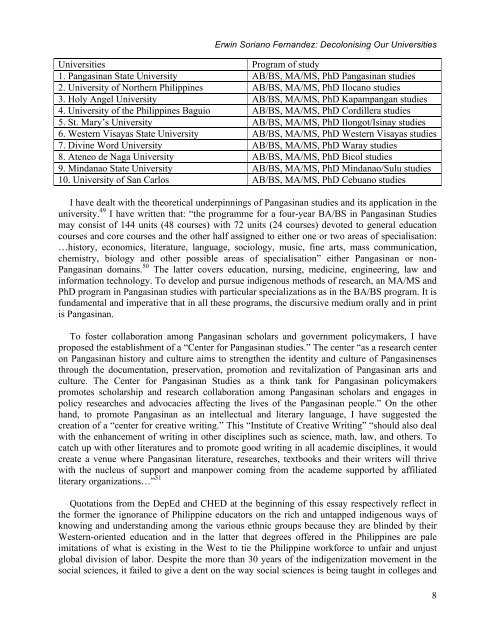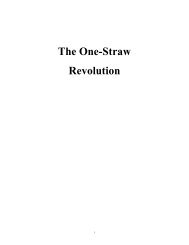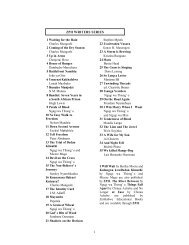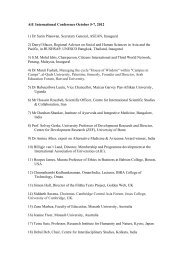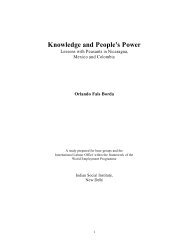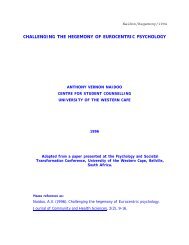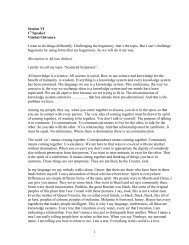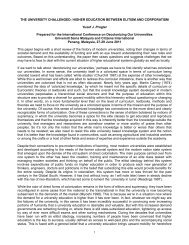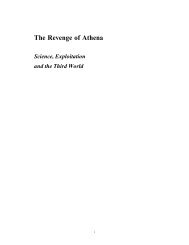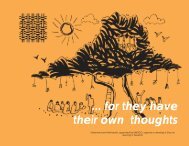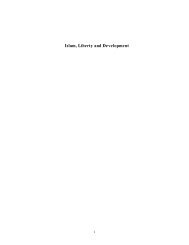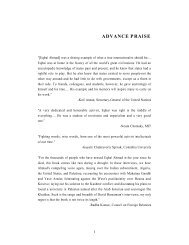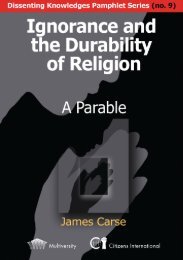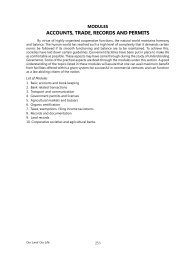1 INTELLECTUAL NEOCOLONIALISM IN THE ... - Multiworld India
1 INTELLECTUAL NEOCOLONIALISM IN THE ... - Multiworld India
1 INTELLECTUAL NEOCOLONIALISM IN THE ... - Multiworld India
You also want an ePaper? Increase the reach of your titles
YUMPU automatically turns print PDFs into web optimized ePapers that Google loves.
Erwin Soriano Fernandez: Decolonising Our Universities<br />
Universities<br />
Program of study<br />
1. Pangasinan State University AB/BS, MA/MS, PhD Pangasinan studies<br />
2. University of Northern Philippines AB/BS, MA/MS, PhD Ilocano studies<br />
3. Holy Angel University AB/BS, MA/MS, PhD Kapampangan studies<br />
4. University of the Philippines Baguio AB/BS, MA/MS, PhD Cordillera studies<br />
5. St. Mary’s University AB/BS, MA/MS, PhD Ilongot/Isinay studies<br />
6. Western Visayas State University AB/BS, MA/MS, PhD Western Visayas studies<br />
7. Divine Word University AB/BS, MA/MS, PhD Waray studies<br />
8. Ateneo de Naga University AB/BS, MA/MS, PhD Bicol studies<br />
9. Mindanao State University AB/BS, MA/MS, PhD Mindanao/Sulu studies<br />
10. University of San Carlos AB/BS, MA/MS, PhD Cebuano studies<br />
I have dealt with the theoretical underpinnings of Pangasinan studies and its application in the<br />
university. 49 I have written that: “the programme for a four-year BA/BS in Pangasinan Studies<br />
may consist of 144 units (48 courses) with 72 units (24 courses) devoted to general education<br />
courses and core courses and the other half assigned to either one or two areas of specialisation:<br />
…history, economics, literature, language, sociology, music, fine arts, mass communication,<br />
chemistry, biology and other possible areas of specialisation” either Pangasinan or non-<br />
Pangasinan domains. 50 The latter covers education, nursing, medicine, engineering, law and<br />
information technology. To develop and pursue indigenous methods of research, an MA/MS and<br />
PhD program in Pangasinan studies with particular specializations as in the BA/BS program. It is<br />
fundamental and imperative that in all these programs, the discursive medium orally and in print<br />
is Pangasinan.<br />
To foster collaboration among Pangasinan scholars and government policymakers, I have<br />
proposed the establishment of a “Center for Pangasinan studies.” The center “as a research center<br />
on Pangasinan history and culture aims to strengthen the identity and culture of Pangasinenses<br />
through the documentation, preservation, promotion and revitalization of Pangasinan arts and<br />
culture. The Center for Pangasinan Studies as a think tank for Pangasinan policymakers<br />
promotes scholarship and research collaboration among Pangasinan scholars and engages in<br />
policy researches and advocacies affecting the lives of the Pangasinan people.” On the other<br />
hand, to promote Pangasinan as an intellectual and literary language, I have suggested the<br />
creation of a “center for creative writing.” This “Institute of Creative Writing” “should also deal<br />
with the enhancement of writing in other disciplines such as science, math, law, and others. To<br />
catch up with other literatures and to promote good writing in all academic disciplines, it would<br />
create a venue where Pangasinan literature, researches, textbooks and their writers will thrive<br />
with the nucleus of support and manpower coming from the academe supported by affiliated<br />
literary organizations…” 51<br />
Quotations from the DepEd and CHED at the beginning of this essay respectively reflect in<br />
the former the ignorance of Philippine educators on the rich and untapped indigenous ways of<br />
knowing and understanding among the various ethnic groups because they are blinded by their<br />
Western-oriented education and in the latter that degrees offered in the Philippines are pale<br />
imitations of what is existing in the West to tie the Philippine workforce to unfair and unjust<br />
global division of labor. Despite the more than 30 years of the indigenization movement in the<br />
social sciences, it failed to give a dent on the way social sciences is being taught in colleges and<br />
8


